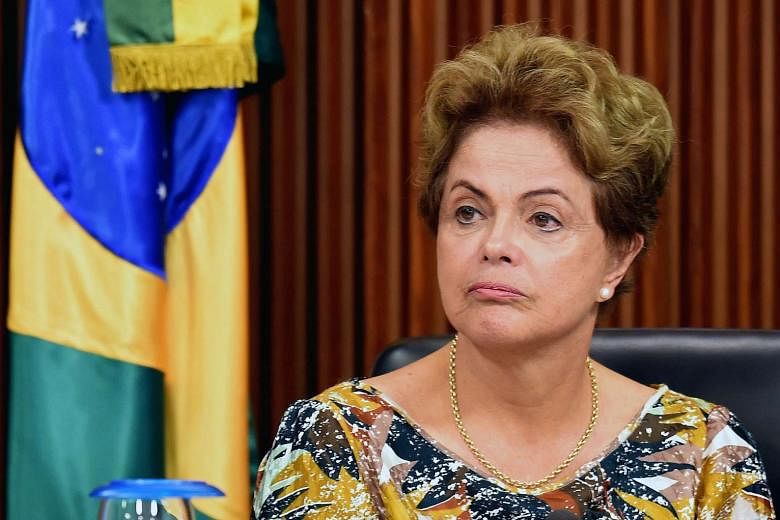BRASILIA (Reuters) - Brazil's government scrambled on Thursday (Sept 10) to reassure investors that it will impose austerity measures to put public finances in order after its credit rating was downgraded to junk status.
President Dilma Rousseff called an emergency Cabinet meeting to brainstorm policies to bridge a fiscal shortfall and how to get them approved by a Congress that has been reluctant to sign off on unpopular belt-tightening measures.
"The plan is to come up with something in the next couple of weeks that we can work on with Congress," Finance Minister Joaquim Levy told journalists.
The Standard & Poor's rating agency on Wednesday (Sept 9) stripped Brazil of its hard-won investment grade rating, downgrading it to "junk" sooner than the government and investors had expected.
The downgrade appeared to strengthen Mr Levy's position. He has been the government's face of austerity but his push for deeper spending cuts to improve Brazil's finances and avoid a downgrade faced resistance inside the Cabinet and Congress.
He said the new round of measures would combine cost-cutting with tax increases. He did not specify what they might be, but said the downgrade forces policymakers into action.
Some senior officials backed that view. "This is a wake-up call for Brazil, for Congress and for the government," said Senator Eunicio Oliveira, leader of the PMDB party, Ms Rousseff's main coalition ally. "There is no alternative but to cut spending and feel the pain."
Ms Rousseff, a leftist who has repeatedly used stimulus packages to try to grow the economy and has failed this year to define a clear path out of recession, changed her tone on Thursday.
In a newspaper interview, the beleaguered President, who recently proposed a 2016 budget with a deficit, said she is now committed to achieving a primary budget surplus equal to 0.7 per cent of GDP.
In addition to cost-cutting, the government would pursue tax hikes to raise revenues, she said. "Unequivocally, we have to expand revenues."
Brazilian assets fell in early trade but later recovered some ground. The real currency ended 1.3 per cent lower and the Bovespa stock index was off 0.3 per cent.
Mr Levy said the new belt-tightening measures would help Brazil, winded by the collapse of a global commodities boom, adjust to lower growth and demand in China.
"This is not a country on the edge of crisis. It's a country that is adjusting itself for a very different global environment," he said in a television interview. "The sooner we adjust, the less costly that transition will be."
To succeed, Ms Rousseff will have to win cooperation from her unruly allies in Congress, which has so far this year largely bucked austerity and in some cases increased spending, not to mention opposition lawmakers, many of whom support calls for her to resign or be impeached.
"The President has no credibility in Congress and many here doubt her ability to continue governing," said Mr Danilo Forte, another PMDB lawmaker. "Raising taxes will be politically very difficult." The government must also overcome its own divisions.
Mr Levy has crossed swords with Mr Nelson Barbosa, the influential Planning Minister and a longtime proponent of state-led development policies.
That has led investors to perceive the government's efforts to impose more fiscal discipline as half-hearted.
In announcing the downgrade, S&P questioned the government's "ability and willingness" to deliver sound economic policy. On Thursday, the agency said it expected Ms Rousseff to face political difficulties in trying to cut deficits.
Stalwarts within the ruling Workers' Party, along with some business groups keen for more of the easy credit and tax breaks that Ms Rousseff first used to counter the economic downturn, are still urging the government for more stimulus.
Former president Luiz Inacio Lula da Silva, Ms Rousseff's mentor and predecessor, played down the impact of S&P's move, a posture that differs with the triumphant stance he took when Brazil won investment grade status in 2008 during his presidency.
The downgrade "doesn't mean anything", he said during a speech in Argentina. "It just means that we can't do what they want us to do. We have to do what we want to do."
But economists say the government has little incentive to ignore investors if it wants to avoid further downgrades by other rating agencies, a move that would make borrowing even more costly and further undermine market confidence.
A rebound "will depend on the country's ability to set up some kind of war Cabinet to deliver the measures", said Mr Octavio de Barros, chief economist at Bradesco, Brazil's second-largest private sector bank.

